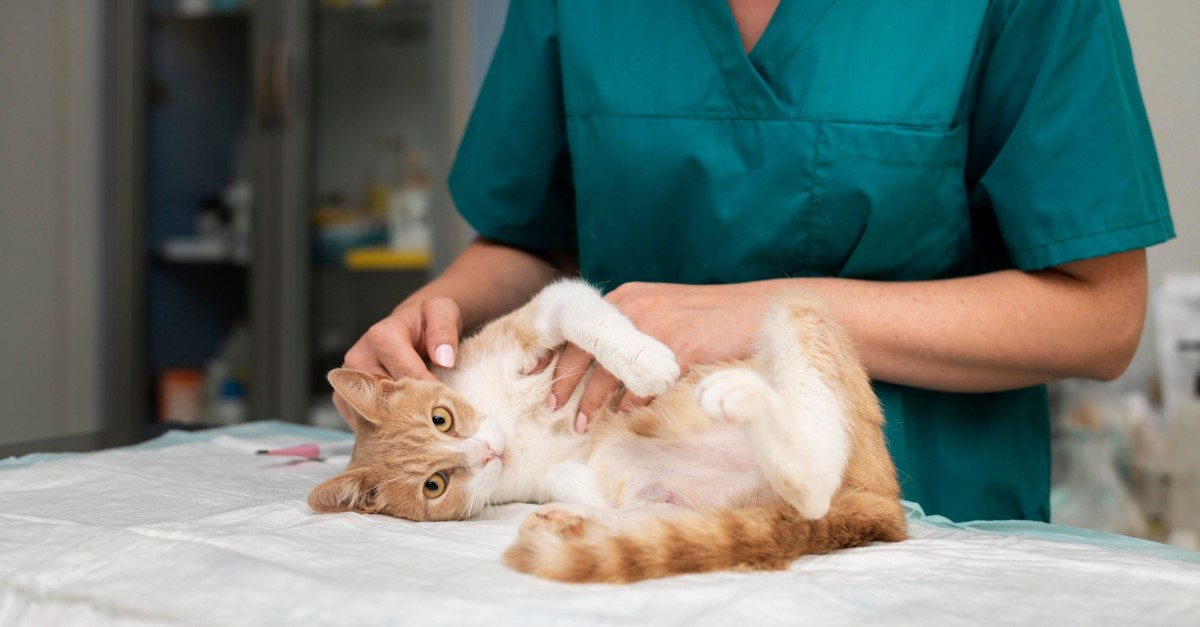Ask Dr. Jenn: Why is my cat shaking her head so much?
My cat is 6 months old and I gave her Frontline a week ago. Today I saw one dead flea and one live one, and she’s shaking her head vigorously. I hate seeing her like this. What else can I do?

It sounds like your kitty may have two different problems – fleas and an ear infection. Fleas can cause cats to scratch and lick excessively, but vigorous head shaking usually indicates an ear infection. Young cats and kittens are more susceptible to ear mite infestations, microscopic bugs that live in the ear canals. With ear mites, there is often a build-up of dark brown or black material in the ear pinna and the ears are very itchy.
Unfortunately, Frontline does not kill ear mites, so you will need a different medication. However, before you purchase an over-the-counter ear mite treatment, a trip to your veterinarian is recommended. Although less common than ear mites, cats can also get yeast or bacterial infections in their ears. Your veterinarian can take a sample of the discharge in the ears to determine what is causing her to shake her head and recommend the best treatment.
Although Frontline won’t take care of ear mites, it is an excellent treatment for fleas. You saw a dead flea so that means the Frontline is working. It is normal to see an occasional live flea even if your treatment is working, due to the lifecycle of the flea.
When our pets have fleas, we only see the adult fleas. But the adult fleas are just the tip of the iceberg. One female flea can lay up to 50 eggs a day. These eggs fall off your pet into the carpet, bedding, and furniture where they hatch, molt, and develop into adult fleas. The adult fleas jump back onto your pet to start feeding and laying eggs, starting the whole cycle over again.
Frontline is an excellent product. It kills adult fleas within thirty minutes and is effective for thirty days. But you may continue to see adult fleas that have just re-infested your pet from her environment and have not been killed by Frontline yet.
It takes a minimum of three months with monthly applications to get a flea infestation under control. You are on the right track with applying Frontline. However, for next month’s flea treatment, I would recommend upgrading to Frontline Plus or Frontline Gold. These products have an additional ingredient that sterilizes the flea eggs so that they cannot hatch.
In addition to treating with Frontline or another similar product, it is important to treat the environment as well. As I mentioned earlier, eggs fall off your pet as she wanders through your house. Vacuum the areas where she commonly lays daily for the first week then at least a couple of times a week for the next couple of months. Empty the vacuum right away so that the eggs don’t hatch inside the vacuum. Wash bedding in hot water to kill fleas and eggs. Treat all the pets in the household even if you don’t see fleas on them. If even just a few fleas are living on an untreated pet, the flea cycle will continue.
Again, it is important to take your kitty to the vet. Not only should you have the ears examined, but fleas can lead to other health problems. Some cats are severely allergic to flea bites, leading to sores from scratching and licking and skin infections. Female fleas feed on the blood of their hosts, in this case your kitty. If there are a lot of fleas, kittens can lose enough blood to become anemic. Fleas can also transmit tapeworms and diseases. Your veterinarian will help determine if your kitty is healthy and give you guidance on the next steps to prevent any serious conditions from the fleas.
I understand how stressful this is for both you and your kitty. I hope that you are able to get her feeling better soon!
Ready to start saving money on pet wellness care?
Then take a look at Mint Wellness, the pet wellness plan that provides fast reimbursement on routine pet care. Save on vaccinations, wellness exams, preventatives, dental, and more!
Learn More


